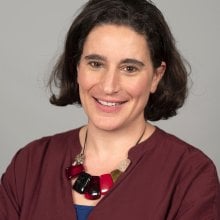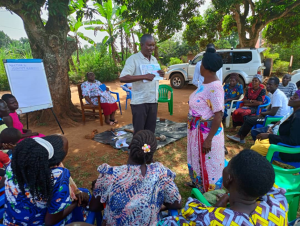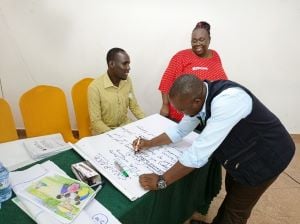NIHR Global Research Professorship 2021-27: Career Devlopment Award
Professor Hannah Kuper
Professor Hannah Kuper is the co-director of the International Centre for Evidence in Disability at the London School of Hygiene & Tropical Medicine and co-founder of the Missing Billion Initiative. She is an epidemiologist by training, and her main focus is on health and healthcare access of people with disabilities in low and middle-income countries. She is an NIHR Global Research Professor.
NIHR Global Research Professorship
Hannah was awarded the NIHR Global Research Professorships in 2021. Please see below details on her research topic.
The Missing Billion: Using participatory approaches to improve access to healthcare for disabled people in Uganda
- Background
There are one billion disabled people globally. Disabled people, on average, have higher healthcare needs than others. Yet they face barriers in accessing healthcare. As a result, they have worse health outcomes, including 2-3 times higher mortality rates across all ages. Policies and laws supporting the right to healthcare for disabled people are often not put into practice.
Evidence is growing that interventions to improve healthcare led by communities are particularly effective. They are low-cost, scalable and address locally relevant concerns. One example is the Participatory Learning and Action (PLA) approach developed to prevent maternal and newborn deaths. Participatory Learning and Action PLA is a community-led participatory strategy to improve healthcare access. In PLA, women's community groups are established and meet monthly to: 1) identify problems, 2) identify solutions, 3) plan and implement solutions and 4) evaluate their efforts. PLA significantly reduces maternal and newborn deaths, usually by at least 20%, and is endorsed by WHO.
- Aim of study
The aim of this study is to assess whether the Participatory Learning and Action for Disability (PLA-D) approach can reduce mortality and improve health of disabled people in Uganda. Uganda is the research setting, given my strong networks and partners and the legal commitments on healthcare provision for disabled people.
- Objectives
- To use an evidenced-based approach to co-create PLA-D. To assess the feasibility of PLA-D implementation.
- To undertake a cluster-based Randomised Controlled Trial (RCT) to assess the effectiveness/cost-effectiveness of PLA-D in reducing mortality.
- To undertake a process evaluation of PLA-D to understand mechanisms for impact and scale-up.
- To strengthen capacity for informing disability policy and practice through the conduct of high-quality research.
- Design and method
Research will be undertaken by a consortium of UK and Uganda based partners. We will identify the problems facing disabled people in accessing healthcare in Uganda, through:
- In-depth interviews with key informants (e.g. disabled people, health workers)
- Analysis of existing numerical data
- Updating reviews on access to healthcare for disabled people.
We will then collaborate with disabled people and health professionals to use this information to adapt the PLA approach for disabled people. We will decide who should facilitate the groups, where they should meet, and how the PLA delivery and materials need to be adapted. Five PLA-D groups will be established, each including about 20 disabled people, and we will assess whether they are feasible to run and if further adaptations are needed.
We will then undertake a trial to assess whether PLA-D is effective. We will identify 128 clusters (villages or city blocks) in Luuka district, and randomly assign them to be in the intervention or control group. In the control group, we will help to strengthen the health system, by undertaking an accessibility audit of health facilities and providing training on disability to healthcare workers. In the intervention group we will establish one PLA-D group per cluster, as well as the health system strengthening activities.
We will interview all disabled people in the study about health and healthcare access at baseline and follow-up (1 year and 2 years), and record if any participants had died. The intervention and control groups will be compared to assess whether mortality rates were lower and health/healthcare access better in the intervention groups than among controls, and what the cost was for the outcomes achieved.
- Community engagement and involvement
Community engagement is at the heart of PLA as well as the Disability Movement with its ethos 'Nothing about us, without us'. Identification of problems and implementation of solutions is led by disabled people themselves. We will include disabled people as advisors at every stage, and as researchers wherever possible.
- Dissemination
Research is most worthwhile if it can be used to improve policy and practice. We will develop tailored strategies to reach our key audiences. We will hold community meetings and with disabled people's organisation. We will engage with policy and programme implementers, both in Uganda and internationally, by producing short documents of key findings and holding meetings. We will reach academics through publishing articles in journals and presenting at key meetings and conferences.
- Partners
Activities from the study
A three-day Training of Trainers (TOT) workshop was held to train the project team. Image (1) shows participants engaged in group work during the training.
Image (2) shows a group facilitator showing picture cards to group member. The group facilitators worked with the group members to identify barriers to healthcare access and develop workable solutions to the identified barriers.



